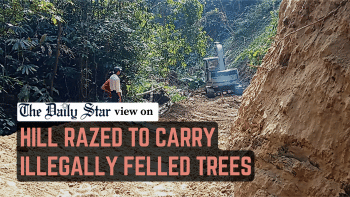Save Moheshkhali’s mangrove forest

We are appalled by the sheer extent of destruction caused to the mangrove forest in Moheshkhali upazila of Cox's Bazar. This forest, planted after the devastating 1991 cyclone, serves as a natural shield against cyclones, tidal surges and flooding. Yet, according to a recent Prothom Alo report, 12,563 acres of this protective forest have been cleared and converted into shrimp enclosures and salt fields by certain quarters. According to local environmental organisations, more than 50 shrimp projects and salt pans now operate in Sonadia where lush mangroves once stood.
The process of destruction is systematic: canals are blocked to cut off water flow, trees are felled, roots are dug out, then the cleared land is set on fire to prepare it like farmland. This industrial-scale clearance can cost up to Tk 1 crore per project, showing that only well-funded, influential actors are involved. Reports show that shrimp projects bring crores of taka in annual profit, but this private gain comes at the expense of public safety. Experts recall how the 1991 cyclone claimed countless lives in Moheshkhali, and how the mangroves were planted precisely to prevent such tragedies. Today, by destroying this shield, coastal communities are once again being put in harm's way.
What is equally alarming is the collective silence among influential quarters across the political spectrum. Cases against mangrove grabbers date back to 1989, yet the main beneficiaries—politically connected investors—escape accountability, while only labourers are made scapegoats. In recent years, ruling party and opposition leaders alike have been named in Forest Department cases, but encroachment continues unabated. From 2010 to May 2025 alone, 196 cases have been filed, naming around 930 accused, yet enforcement remains weak. Even High Court orders have been ignored on the grounds.
The administration has recently identified 45 kilometres of illegal embankments and requested Tk 4.2 crore for their removal. The interim government has also cancelled BEZA's allotment of Sonadia land, which may reduce future destruction. But unless strong, sustained measures are taken—including establishing permanent Ansar or forest camps in Sonadia, prosecuting influential investors, and replantation of the mangroves—these gains will be temporary. The destruction of Moheshkhali's mangroves is not just an environmental crime, but a national security threat. The government must treat this as an urgent priority and stop all new shrimp and salt projects inside the forest areas, demolish illegal embankments, and hold the powerful encroachers accountable.


 For all latest news, follow The Daily Star's Google News channel.
For all latest news, follow The Daily Star's Google News channel. 




Comments